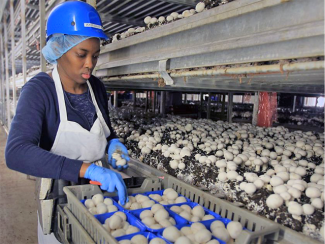PICKING WINNERS
Support mushrooms in migrant workers' fight for justice

MARISOL VERIDIANO BOBADILLA IS TREATED LIKE THE MUSHROOMS SHE PICKS. She is kept in the dark and fed bullshit.
That’s why Marisol was one of several hundred migrant workers demonstrating for better working conditions in downtown Toronto last month. The workers also took aim at the Ford government’s vindictive action against them. Recent cuts to legal aid in Ontario ban Legal Aid Ontario from using provincial funds to support legal cases for refugees and immigrants.
Marisol is a victim of a classic “bait and switch” con used by recruiters. She was lured to Canada with a promise of a full-time job in health care. When she got here the only job on offer was as a mushroom picker.
A job no person would want
Marisol toiled as a mushroom picker for over two-and-a-half years. “Even on the first day, I never liked the job and no person would want it either,” she explains. Sometimes Marisol would retrieve mushrooms 30 feet above ground level with a knife and just a single harness preventing her from falling.
It is bone-crushing, dangerous work. Workers are paid by how much they pick, not by how long they work. This means workers are often forced to work for 18 hours a day, at a killing pace.
They do it all without any labour law protections or health insurance. Most are migrants. They have virtually no rights under Canada’s hardline immigration system, and face the threat of being deported if they complain.
In 2017, nearly 100,000 temporary foreign workers were employed in Canada. Migrant workers are found in a broad range of Canadian industries, but most frequently work in positions characterized by their long hours, physical demands and low pay. This includes up to 24,000 seasonal agricultural worker program participants on farms across Ontario.
Fighting for migrant workers’ rights
Omar Walcot is another migrant worker who spends eight months every year in Canada due to the lack of jobs in his native Jamaica. He is a fruit picker on farms in Ontario. Omar knows all too well what it is like to be separated from his family to provide for his family.
“I would love if all of us get permanent status on arrival because if I get that, one day, my family would be around me and I wouldn’t have to be alone today,” says., Omar, who has a 3-year-old and 14-year-old back home in Jamaica.
Marisol is one of four migrant workers who are suing a recruiting agency over their mistreatment on the job. The so-called “mushroom four” also includes Maila Ceguerra, Jesse Veneranda, and Lourdes de la Pena.
The group alleges that Link4Staff, an agency based in Vaughan, Ontario deducted a total of $82,000 from their paychecks in fees for services that never materialized. Additionally, the firm promised the workers that they would get work permits, but they never did.
The four workers want Ontario to establish a licensing system for recruiters and regulate employers more strictly to weed out abusive bosses. They have established a group called Justice for Mushroom Four to raise public awareness about their fight for justice. The group has set up a petition calling for more protections for immigrants.
“From day one, we knew we were underpaid,” says Marisol, “but we were vulnerable at that time. Now we know better. We know if we don’t do something, there will be more migrant workers who will be like us.”
Organized support
Action to end the mistreatment faced by migrant workers like the Mushroom Four is growing, with mounting support from campaign groups, trade unions, and other activists like the Migrant Workers Alliance for Change. The Alliance describes the hundreds of thousands of migrant workers in Canada as “second-class citizens” due to their lack of rights. MWAC calls for all immigrants to have access to permanent residency and for the unity of migrant families in Canada.
Syed Hussan, coordinator of MWAC, explained that two thirds of all immigrants to Canada are currently denied access to basic services and have no path to escape the vicious cycle of temporary permits. “We’ve created a two-tiered immigrant system…everyone must have the same right,” he stated. “This platform is what everyone needs, it’s justice for all people.”
The Migrant Rights Network coalition was launched last December and also participated in the protest. The coalition is warning that hate crimes against migrant workers are on the rise across Canada and that more needs to be done to fight back.
Among their demands is a call for mass action and popular education to stop the rise of the xenophobic far-right, and an appeal for issues facing migrant workers to be linked with problems confronted by all workers, like the cutting of the minimum wage.
The Migrant Rights Network is organizing a series of days of action for September 2.
- 30 -












Add new comment